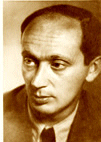Alexander Uriyah Boskovich (Cluj, Hungary, now Romania, 1907 – Tel-Aviv, 1964, immigrated in 1938), a composer and critic, also essayist, translator, revered teacher and lecturer (also pianist and conductor), was the leading ideologist of Israeli music, exerting considerable influence on the second generation of Israeli composers through his thoughtful, albeit opinionated, ideas concerning national identity in Israeli music. He studied with Nadia Boulanger and Paul Dukas, and immigrated to Palestine following a performance of his Chansons populaires Juifes by the Palestine Orchestra in 1938. He was among the founders and principal teachers at the Tel-Aviv Conservatory and Academy of Music (1944-1964), and served as a music critic of the influential daily Haaretz (1956-1964). Soon after his immigration he became a fervent advocate of local style, emphasizing the ultimate significance of expressions of the time (contemporary) and place (Eretz Israel, as a part of the Middle East) in a composition. His interpretations of these expressions have influenced Israeli music since, bearing a whole range of reactions, from devout supporters to vehement opponents. During the 1940s and 1950s he preached for a distinct local style that would synthesize Western tradition with Mediterranean and specifically Mizrahi elements—modes, forms, textures, rhythms, and orchestration such as Arab maqamat, taqsim and nouba, heterophony, uneven meter and rhythms, and preference for woodwinds, strings, and certain percussions. Among the famous pieces of his modest oeuvre are his influential Semitic Suite (piano; also for orchestra, 1945), Oboe Concerto (1942), Adonai Roi (My Lord Is My Shepherd, alto and orchestra, 1943) and the cantata Bat-Israel (The Daughter of Israel, 1961). In his late works, such as Concerto da Camera (1961), he adopted serial techniques based on ornamental melodic cells. In his last, unfinished work, Names, (1964) he conceived new ideas concerning the use of rhythms of the Hebrew language. Hirshberg and Shmueli’s book covers Boskovich’s biography, ideology, and style analyses.
Written by Dr. Ronit Seter




